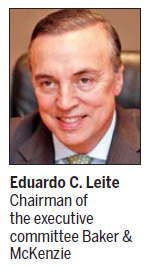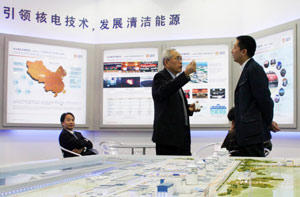Global law firm helps investors understand new business settings
Updated: 2011-10-28 10:03
By Wang Huazhong (China Daily)
|
|||||||||||
|
|
The key to overcoming these problems, says Eduardo C. Leite, chairman of executive committee of Baker & McKenzie, is for companies to understand the complexity of the local regulatory framework and culture.
Partners at the law firm told China Daily that many international investors have trouble obtaining local licenses, understanding tax structures, and handling labor and intellectual property issues.
These problems were very common, Leite said, and were made worse when businesses, foreign and domestic, sought to invest overseas but lacked the proper advice.
"The real challenge for cross-border transactions is to understand the complexity of them and be willing to understand and put it all together instead of just getting there early," he said.
Transactions sometimes failed because businessmen had rigid agendas or assumed simply talking to government officials would resolve their problems, said Leite, a 61-year-old Brazilian who has been a partner at the firm since 1986 and focuses on energy and mining deals.
"Improving the knowledge of each other's country and culture is essential," he said. "It is important for an investor not only to look at the short term, but also to establish a very solid base for business exchanges over the long term."
Baker & McKenzie retains 3,800 lawyers in 42 countries, but Leite said it is dedicated to bridging the cultural and informational gaps for inbound and outbound investors in the booming Chinese market.
The firm has advised the Chinese government, legislators and renowned commercial clients through its Hong Kong office, established in 1974, Beijing office, opened in 1993, and Shanghai office, started in 2002.
The firm also helps businesses at important stages of deals, including performing due diligence and handling issues that crop up before and after acquisitions.
"We understand local cultures," Leite said. "We tell clients not only what the legal regulations are, but also what is culturally acceptable."
He said Chinese firms also needed the proper advice.
"The best thing for Chinese clients is to have someone in Beijing to explain how things would be if something was not happening in China," Leite said. "Once clients understand the differences, the business decisions become easier and safer."
The "client-driven" strategy is being discussed at the firm's annual convention, which started on Monday in Beijing and ends on Saturday. Local clients have been invited to give their advice on how the firm can help deal with the issues facing them.











